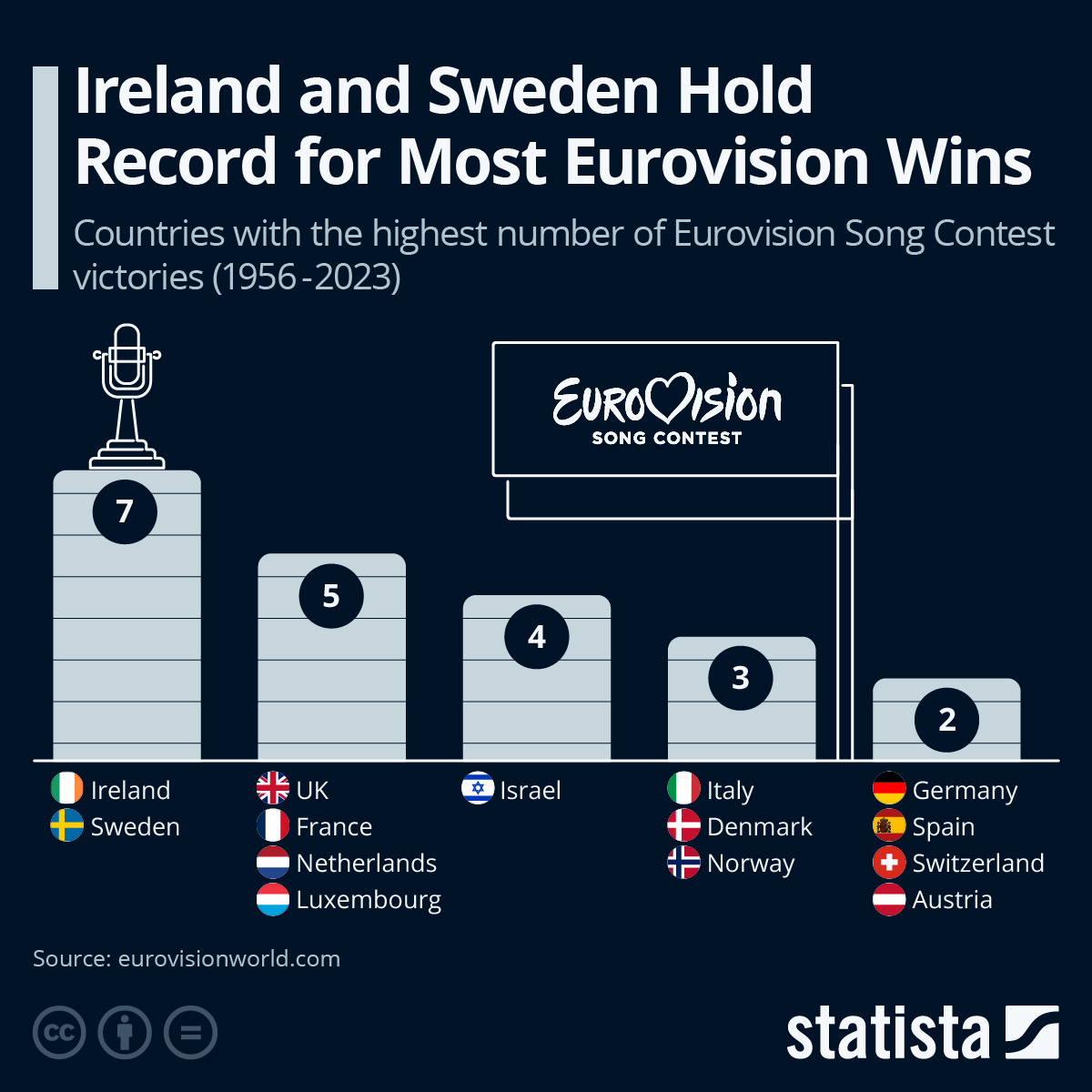The Eurovision Song Contest, a beloved annual event, showcases the rich tapestry of European music and culture. Since its inception in 1956, the competition has seen numerous countries battle it out for the title, with some emerging as clear favorites. Understanding which countries have achieved the most wins provides insight into the evolving tastes of European audiences and the dynamics of this vibrant competition.
In this article, we will delve deep into the countries that have dominated the Eurovision Song Contest, analyzing their winning strategies, memorable performances, and the impact of their victories on their national music scenes. Additionally, we will explore the reasons behind the success of these nations and what it takes to win this prestigious contest.
From Sweden's pop powerhouse to Ireland's record-breaking wins, the landscape of Eurovision is filled with fascinating stories. Join us as we explore the most successful countries in Eurovision history and what makes them stand out in this iconic competition.
Table of Contents
- A Brief History of Eurovision
- Top Winning Countries in Eurovision
- Ireland: The Record Holders
- Sweden: The Pop Powerhouse
- United Kingdom: A Legacy of Hits
- France: The Cultural Influence
- Norway: A Unique Journey
- Conclusion
A Brief History of Eurovision
The Eurovision Song Contest began in 1956, with just seven countries participating. The event was conceived as a way to bring European nations together through music in the post-war era. Over the years, it has evolved into a grand spectacle with elaborate performances, diverse musical genres, and a massive global audience.
Initially, the competition featured a small number of entries, but as its popularity grew, more countries joined, and the format changed. Today, Eurovision includes semi-finals, allowing a wider range of countries to participate. The contest has also embraced technology and social media, engaging fans in new ways.
Top Winning Countries in Eurovision
As of 2023, several countries have made their mark by winning the Eurovision Song Contest multiple times. Here are the top countries with the most wins:
- Ireland - 7 Wins
- Sweden - 6 Wins
- United Kingdom - 5 Wins
- France - 5 Wins
- Norway - 3 Wins
Ireland: The Record Holders
Ireland holds the record for the most wins in Eurovision history, with a remarkable seven victories. Their winning songs range from traditional ballads to contemporary pop hits, showcasing the country's diverse musical talent.
| Year | Artist | Song |
|---|---|---|
| 1970 | Dana | All Kinds of Everything |
| 1980 | Johnny Logan | What's Another Year |
| 1987 | Johnny Logan | Hold Me Now |
| 1992 | Linda Martin | Why Me? |
| 1993 | Niamh Kavanagh | In Your Eyes |
| 1994 | Paul Harrington & Charlie McGettigan | Rock 'N' Roll Kids |
| 1996 | Eimear Quinn | The Voice |
Sweden: The Pop Powerhouse
Sweden has established itself as a dominant force in the Eurovision Song Contest, with six wins to its name. The country is known for its high-quality pop music and has produced numerous successful artists who have left a mark on the competition.
- ABBA - 1974
- Cara Mia - 2008
- Heroes - 2015
Sweden's winning entries often feature catchy melodies, strong vocals, and elaborate staging, making them favorites among both juries and viewers. The country's success can be attributed to its well-structured national selection process, Melodifestivalen, which showcases a wide variety of musical styles and talents.
United Kingdom: A Legacy of Hits
The United Kingdom has a rich history in the Eurovision Song Contest, with five victories. The UK's entries have often been characterized by their theatrical performances and strong lyrical content.
- Puppet on a String - 1967
- Save Your Kisses for Me - 1976
- Making Your Mind Up - 1981
Despite its historical success, recent years have been challenging for the UK, with several lower placements in the competition. However, the legacy of its past victories continues to influence the country's approach to the contest.
France: The Cultural Influence
France, with its five wins, has a long-standing tradition in the Eurovision Song Contest. The country's entries often reflect its rich cultural heritage and diverse musical influences.
- Poupée de cire, poupée de son - 1965
- Élan - 1973
- J'ai cherché - 2018
France's success can be attributed to its ability to blend traditional French music with contemporary styles, creating entries that resonate with both juries and audiences across Europe.
Norway: A Unique Journey
Norway has secured three Eurovision victories, showcasing its unique musical identity. The country is known for its willingness to experiment with different genres and styles, resulting in memorable performances.
- La det swinge - 1985
- Nocturne - 1995
- Fairytale - 2009
Norway's success in Eurovision reflects its vibrant music scene and the creativity of its artists, making it a country to watch in future contests.
Conclusion
The Eurovision Song Contest is not only a celebration of music but also a reflection of cultural diversity across Europe. Countries like Ireland, Sweden, the United Kingdom, France, and Norway have made significant contributions to the contest's history through their remarkable wins.
As we look forward to future editions of Eurovision, the competition continues to evolve, embracing new musical trends and styles. Fans can expect exciting performances and unforgettable moments as countries vie for the coveted title. We encourage you to share your thoughts on the most memorable Eurovision moments in the comments below and explore more articles on our site.
Thank you for taking the time to read about the most successful countries in Eurovision history. We hope to see you back here for more engaging content!
Understanding The Gaslight Word Origin: A Deep Dive Into Its Historical Roots And Modern Usage
Exploring The Legacy And Future Of Manchester United Players


